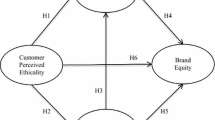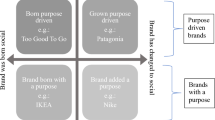Abstract
The recent rise in ethical consumerism has seen increasing numbers of corporate brands project a socially responsible and ethical image. But does having a corporate brand that is perceived to be ethical have any influence on outcome variables of interest for its product brands? This study analyzes the relationship between perceived ethicality at a corporate level, and brand trust, brand affect and brand loyalty at a product level. A theoretical framework with hypothesized relationships is developed and tested in order to answer the research question. Data have been collected for 45 product categories in the fast moving consumer goods sector using a panel of 4,027 Spanish consumers. The proposed relationships are tested using structural equations modeling. The results suggest there is a positive relationship between perceived ethicality of a brand and both brand trust and brand affect. Brand affect also positively influences brand trust. Further, brand trust and brand affect both show a positive relation with brand loyalty. The managerial and academic implications of the results are discussed.

Similar content being viewed by others
Notes
The huge Chi-square value relative to the degrees of freedom and reduced magnitude of every correlation among error terms (unique components) that was left to be estimated freely convinced us that the initial rejection of the model was clearly due to a situation of excessive power.
Abbreviations
- CSR:
-
Corporate social responsibility
- CPE:
-
Consumer perceived ethicality
References
Amine, A. (1998). Consumers’ true brand loyalty: The central role of commitment. Journal of Strategic Marketing, 6(4), 305–319.
Andaleeb, S. S. (1992). The trust concept: Research issues for channels of distribution. Research in Marketing, 11, 1–34.
Bagozzi, R. P., & Yi, Y. (1988). On the evaluation of structural equation models. Journal of the Academy of Marketing Science, 16(1), 74.
Balmer, J. M. T. (1995). Corporate branding and connoisseurship. Journal of General Management, 21(1), 24–46.
Balmer, J. M. T. (2010). Explicating corporate brands and their management: Reflections and directions from 1995. Journal of Brand Management, 18(3), 180–196.
Balmer, J. M. T., & Gray, E. R. (2003). Corporate brands: What are they? What of them? European Journal of Marketing, 37(7), 972–997.
Barbalet, J. M. (1996). Social emotions: Confidence, trust and loyalty. The International Journal of Sociology and Social Policy, 16(9), 75–96.
Barret, P. (2007). Structural equation modelling: Adjudging model fit. Personality and Individual Differences, 42(5), 815–824.
Becker, L. C., & Becker, C. B. (1992). Encyclopedia of ethics. New York: Garland Publishing.
Brodie, R. J., Glynn, M. S., & Little, V. (2006). The service brand and the service-dominant logic: Missing fundamental premise or the need for stronger theory? Marketing Theory, 6(3), 363–379.
Brown, T. J., & Dacin, P. A. (1997, Jan). The company and the product: Corporate associations and consumer product responses. The Journal of Marketing, 61(1), 68–84.
Brunk, K. H. (2010a). Exploring origins of ethical company/brand perceptions—a consumer perspective of corporate ethics. Journal of Business Research, 63(3), 255–262.
Brunk, K. H. (2010b). Exploring origins of ethical company/brand perceptions—reply to Shea and Cohn’s commentaries. Journal of Business Research, 63(12), 1364–1367.
Brunk, K. H. (2011). Un/ethical company and brand perceptions: Conceptualising and operationalising consumer meanings. Journal of Business Ethics (submitted).
Bussey, N. (2006). Is it important to be an ethical brand? Campaign, 11, 17.
Carrigan, M., & Attalla, Ahmad. (2001). The myth of the ethical consumer—do ethics matter in purchase behaviour? Journal of Consumer Marketing, 18(7), 560–578.
Chaudhuri, A., & Holbrook, M. B. (2001). The chain of effects from brand trust and brand affect to brand performance: The role of brand loyalty. Journal of Marketing, 65(2), 81–93.
Clark, N. (2008). How ethical is your brand? Marketing, 00253650, 24–25.
Clegg, A. (2007). Unlock the power of brands. Marketing Week 04.01.07, p. 23.
Cohn, D. (2010). Commentary essay on exploring origins of ethical company/brand perceptions—a consumer perspective of corporate ethics. Journal of Business Research, 63(12), 1367–1368.
Delgado-Ballester, E., & Munuera-Alemán, J. L. (2001). Brand trust in the context of consumer loyalty. European Journal of Marketing, 35(11), 1238–1258.
Dick, A. S., & Basu, K. (1994). Customer loyalty: Toward an integrated conceptual framework. Journal of the Academy of Marketing Science, 22(2), 99–113.
Doney, P. M., & Cannon, J. P. (1997). An examination of the nature of trust in buyer–seller relationships. Journal of Marketing, 61(2), 35.
Doonar, J. (2005). A question of ethics. Brand Strategy, 193, 24–27.
Dunn, J. R., & Schweitzer, M. E. (2005). Feeling and believing: The influence of emotion on trust. Journal of Personality and Social Psychology, 88(5), 736–748.
Ethics pay for GE, eBay. (2011, March). WARC report [omitted for blind review].
Fan, Y. (2005). Ethical branding and corporate reputation. Corporate Communications, 10(4), 341–350.
Fornell, C., & Larcker, D. F. (1981). Evaluating structural equation models with unobservable variables and measurement error. Journal of Marketing Research, 18(February), 39–50.
Fournier, S. (1998). Consumers and their brands: Developing relationship theory in consumer research. Journal of Consumer Research, 24(4), 343–373.
Fukukawa, K., Balmer, J. M. T., & Gray, E. R. (2007). Mapping the Interface between corporate identity, ethics and corporate social responsibility. Journal of Business Ethics, 76(1), 1–15.
Glomb, T. M., Bhave, D. P., Miner, A. G., & Wall, M. (2011). Doing good, feeling good: Examining the role of organizational citizenship behaviors in changing mood. Personnel Psychology, 64(1), 191–223.
Green is the new dream: Green purchasing in North America. (2010, May). Euromontior International. Retrieved from [omitted for blind review].
Gundlach, G. T., Achrol, R. S., & Mentzer, J. T. (1995). The structure of commitment in exchange. Journal of Marketing, 59(1), 78–92.
Hartman, L. P. (1998). Perspectives in business ethics. Chicago: Irwin McGraw-Hill.
Hatch, M. J., & Schultz, M. (2010). Toward a theory of brand co-creation with implications for brand governance. Journal of Brand Management, 17(8), 590–604.
Huber, F., Vollhardt, K., Matthes, I., & Vogel, J. (2010). Brand misconduct: Consequences on consumer–brand relationships. Journal of Business Research, 63(11), 1113–1120.
Hunt, S. D., & Vitell, S. (1986). A general theory of marketing ethics. Journal of Macromarketing, 6(Spring), 5–15.
Iglesias, O., Montaña, J., & Sauquet, A. (2011). The role of corporate culture in relationship marketing. European Journal of Marketing, 454, 631–650.
Jacoby, J., & Chestnut, R. W. (1978). Brand loyalty: Measurement and management. New York: Wiley.
Joreskog, K. G., & Sorbom, D. (1999). LISREL 8: structural equation modeling with the SIMPLIS command language. Lincolnwood, IL: Scientific Software International.
Kline, R. B. (2005). Principles and practice of structural equation modeling. New York: Guilford.
Kumar, S., & Advani, J. (2005). Factors affecting brand loyalty: A study in an emerging market on fast moving consumer goods. Journal of Customer Behavior, 4, 251–275.
Luchs, M. G., Naylor, R. W., Irwin, J. R., & Raghunathan, R. (2010). The sustainability liability: Potential negative effects of ethicality on product preference. Journal of Marketing, 74(5), 18–31.
Luo, X., & Bhattacharya, C. B. (2006). Corporate social responsibility, customer satisfaction, and market value. Journal of Marketing, 70(4), 1–18.
Luo, X., & Bhattacharya, C. B. (2009). ‘The debate over doing good: Corporate social performance, strategic marketing levers, and firm-idiosyncratic risk. Journal of Marketing, 73(6), 198–213.
Matzler, K., Bidmon, S., & Grabner-Kräuter, Sonja. (2006). Individual determinants of brand affect: The role of the personality traits of extraversion and openness to experience. Journal of Product and Brand Management, 15(7), 427–434.
Matzler, K., Grabner-Kräuter, S., & Bidmon, S. (2008). Risk aversion and brand loyalty: The mediating role of brand trust and brand affect. Journal of Product & Brand Management, 17(3), 154–162.
Maxfield, S. (2008). Reconciling corporate citizenship and competitive strategy: Insights from economic theory. Journal of Business Ethics, 80(2), 367–377.
Mayer, R. C., Davis, J. H., & Schoorman, F. D. (1995). An integrative model of organizational trust. Academy of Management Review, 20(3), 709–734.
Morgan, R. M., & Hunt, S. D. (1994). The commitment-trust theory of relationship marketing. Journal of Marketing, 58(3), 20.
Morsing, M. (2006). Corporate moral branding: Limits to aligning employees. Corporate Communications, 11(2), 97–108.
Myers, D., & Tingley, D. (2011). The influence of emotion on trust. http://scholar.harvard.edu/dtingley/files/emotionmanipulationm11.pdf (submitted).
Oliver, R. L. (1999). Whence consumer loyalty? Journal of Marketing, 63(4), 33–44.
Page, G., & Fearn, H. (2005). Corporate reputation: What do consumers really care about? Journal of Advertising Research, 45(3), 305–313.
Payne, A., Storbacka, K., Frow, P., & Knox, S. (2009). Co-creating brands: Diagnosing and designing the relationship experience. Journal of Business Research, 62(3), 379–389.
Prahalad, C. K., & Ramaswamy, V. (2004). Co-creation experiences: The next practice in value creation. Journal of Interactive Marketing, 18(3), 5–14.
Reichheld, F. F., & Schefter, P. (2000). E-loyalty. Harvard Business Review, 78(4), 105–113.
Saris, W. E., Satorra, A., & Van der Veld, W. M. (2009). Testing structural equation models or detection of misspecifications?. Structural Equation Modeling: A Multidisciplinary Journal, 16, 561–582.
Schoorman, F. D., Mayer, R. C., & Davis, J. H. (2007). An integrative model of organizational trust: Past, present, and future. Academy of Management Review, 32(2), 344–354.
Sen, S., & Bhattacharya, C. B. (2001). Does doing good always lead to doing better? Consumer reactions to corporate social responsibility. Journal of Marketing Research (JMR), 38(2), 225–243.
Shaw, C., & Ivens, J. (2002). Building great customer experiences. New York: Palgrave Macmillan.
Shaw, D., & Shiu, E. (2002). The role of ethical obligation and self-identity in ethical consumer choice. International Journal of Consumer Studies, 26(2), 109–116.
Shea, L. J. (2010). Using consumer perceived ethicality as a guideline for corporate social responsibility strategy: A commentary essay. Journal of Business Research, 63(3), 263–264.
Sirdeshmukh, D., Singh, J., & Sabol, B. (2002). Consumer trust, value, and loyalty in relational exchanges. Journal of Marketing, 66(1), 15–37.
Story, J., & Hess, J. (2010). Ethical brand management: Customer relationships and ethical duties. Journal of Product & Brand Management, 19(4), 240–249.
Sung, Y., & Kim, J. (2010). Effects of brand personality on brand trust and brand affect. Psychology & Marketing, 27(7), 639–661.
Szmigin, I., Carrigan, M., & O’Loughlin, D. (2007). Integrating ethical brands into our consumption lives. Journal of Brand Management, 14(5), 396–409.
Valuing the Consumer. (2001, September). Corporate Social Responsibility Magazine 3(1), 4–8.
Author information
Authors and Affiliations
Corresponding author
Rights and permissions
About this article
Cite this article
Singh, J.J., Iglesias, O. & Batista-Foguet, J.M. Does Having an Ethical Brand Matter? The Influence of Consumer Perceived Ethicality on Trust, Affect and Loyalty. J Bus Ethics 111, 541–549 (2012). https://doi.org/10.1007/s10551-012-1216-7
Received:
Accepted:
Published:
Issue Date:
DOI: https://doi.org/10.1007/s10551-012-1216-7




